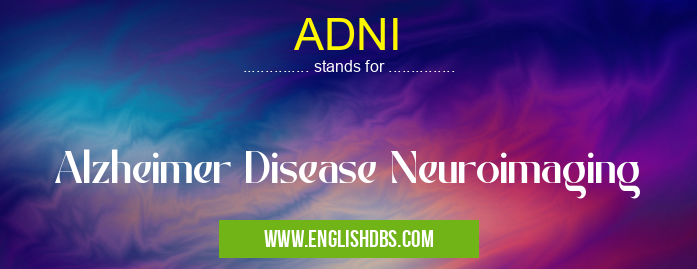What does ADNI mean in DISEASES
ADNI stands for Alzheimer's Disease Neuroimaging Initiative. It is a longitudinal study that aims to investigate the progression of Alzheimer's disease (AD). The initiative involves the collection and analysis of data from individuals with AD, as well as those at risk of developing the disease.

ADNI meaning in Diseases in Medical
ADNI mostly used in an acronym Diseases in Category Medical that means Alzheimer Disease Neuroimaging
Shorthand: ADNI,
Full Form: Alzheimer Disease Neuroimaging
For more information of "Alzheimer Disease Neuroimaging", see the section below.
ADNI in MEDICAL
ADNI is a comprehensive study that focuses on the early detection and characterization of AD. The data collected through ADNI enables researchers to:
- Identify biomarkers for AD that can aid in diagnosis and prognosis.
- Monitor the progression of AD over time.
- Evaluate the effectiveness of potential treatments for AD.
ADNI Full Form
Alzheimer Disease Neuroimaging Initiative
What does ADNI Stand for?
ADNI stands for Alzheimer's Disease Neuroimaging Initiative. It is a research program that aims to:
- Enhance our understanding of Alzheimer's disease.
- Develop new methods for diagnosing and treating AD.
- Identify risk factors for developing AD.
Essential Questions and Answers on Alzheimer Disease Neuroimaging in "MEDICAL»DISEASES"
What is ADNI?
ADNI stands for Alzheimer's Disease Neuroimaging Initiative. It is a multi-center, longitudinal research study that aims to understand early changes in the brain and body that occur in Alzheimer's disease (AD).
What are the goals of ADNI?
ADNI's primary goals include:
- Identifying biomarkers that can help diagnose AD early and track its progression.
- Understanding the relationship between genetic, environmental, and lifestyle factors and the development of AD.
- Developing and testing new treatments for AD.
Who participates in ADNI?
ADNI participants are individuals aged 55 and older with a range of cognitive health conditions, including cognitively normal, mild cognitive impairment (MCI), and AD.
What types of data are collected in ADNI?
ADNI collects a wide range of data, including:
- MRI and PET scans to image the brain
- Cognitive tests to assess memory, thinking, and language skills
- Blood and cerebrospinal fluid samples for biomarker analysis
- Genetic information
- Demographic and lifestyle information
How can I participate in ADNI?
If you are interested in participating in ADNI, you can visit the ADNI website (http://www.adni-info.org) or contact a participating ADNI clinical site.
What is the expected impact of ADNI?
ADNI's findings are expected to have a significant impact on the understanding and treatment of Alzheimer's disease. By identifying biomarkers and understanding disease mechanisms, ADNI aims to improve diagnosis, predict progression, and develop new therapies for AD.
Final Words: ADNI is a vital research initiative that contributes significantly to the field of Alzheimer's disease research. The data collected through ADNI has provided valuable insights into the disease and has helped to identify potential targets for treatment. The continuation of ADNI is essential for advancing our understanding of AD and developing effective strategies to combat it.
ADNI also stands for: |
|
| All stands for ADNI |
